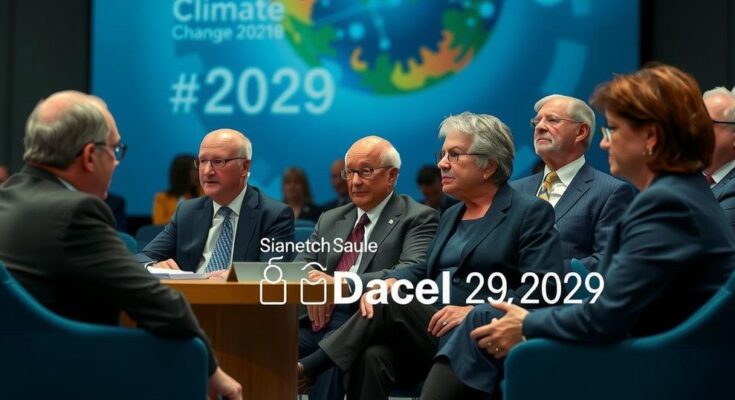At COP29, world leaders exhibited stark divisions on climate action amidst alarming carbon emissions reports. A new analysis indicates that global carbon neutrality must be achieved by the late 2030s to meet climate goals. Meanwhile, calls for increased climate finance and immediate fossil fuel phase-out intensified, especially from nations severely impacted by climate change.
At the COP29 climate conference in Azerbaijan, global leaders showcased their divergent approaches to addressing climate change, reflecting a stark division among nations. A report from the Global Carbon Project revealed that carbon dioxide emissions from fossil fuels have reached unprecedented levels this year, necessitating a more urgent shift towards carbon neutrality. The report emphasizes the need to achieve net-zero emissions by the late 2030s, as opposed to the previously accepted target of 2050, in order to adhere to the Paris Agreement’s goal of limiting global warming to 1.5 degrees Celsius. During the conference, Azerbaijani negotiator Yalchin Rafiyev underscored the diminishing timeframe for decisive action, urging leaders to prioritize climate finance and support for developing nations facing the brunt of climate impacts. Conversely, leaders from countries reliant on fossil fuels expressed their concerns about the economic feasibility of an immediate transition to green energy. This conflict was articulated by Italian Prime Minister Giorgia Meloni, who warned against prioritizing decarbonization at the cost of economic sustainability. These discussions occur against a backdrop of heightened anxiety regarding future climate actions, particularly with the anticipated political shift in the United States under the leadership of Donald Trump, who intends to renegotiate participation in the Paris Agreement. Meanwhile, representatives from vulnerable nations, such as Tuvalu, reiterated the urgency of phasing out fossil fuels in light of looming existential threats posed by climate change. As the dialogues continued, negotiators released a new finance draft, which proposes diverse funding mechanisms but lacks consensus on key issues. Developing nations are seeking substantial financial commitments from wealthier countries, emphasizing the need for grants over loans to address their climate-related challenges. Prime Minister Philip Davis of the Bahamas highlighted this imbalance in funding priority, noting that vulnerable island nations have disproportionately faced debt burdens in comparison to received climate expenditures. In conclusion, the COP29 conference underscored a critical juncture in global climate policy, illustrating a significant divide among nations regarding their commitment to combat climate change, particularly in relation to carbon emissions and financial support for adaptation initiatives.
The COP29 climate conference serves as a pivotal platform for global leaders to discuss and establish strategies to combat climate change. This year’s conference is notably marked by record-high emissions from fossil fuels and an urgent call for nations to accelerate efforts towards carbon neutrality. The discussions are intensified by geopolitical shifts, particularly the potential withdrawal of the United States from international climate agreements, affecting negotiations around funding mechanisms for developing nations facing severe climate challenges. The urgency expressed by numerous leaders reflects the growing consensus on the necessity for immediate and significant climate action to avert further catastrophic impacts.
The COP29 conference revealed a profound imbalance in perspectives on climate action among world leaders. With emissions surging to record levels, urgent calls for accelerated targets and effective climate finance underscore the inherent tensions between developed and developing nations. The leadership from vulnerable countries highlights the pressing need for concrete action and support to combat climate change, making it imperative for nations to reconcile their differing priorities in order to achieve meaningful progress before it is too late.
Original Source: www.wionews.com




